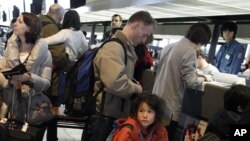Some foreign governments have begun advising their citizens to leave Japan, as the outlook for a crippled nuclear power plant becomes increasingly unclear. On Thursday the United States and Britain joined several other nations in recommending their citizens consider leaving the capital or the country.
Until Thursday, the U.S. had been telling its citizens to follow Japanese advice -- a 20 kilometer evacuation zone around the plant and the need to stay inside and close windows in a 20 to 30 kilometer zone.
Wednesday afternoon, U.S. Ambassador John Roos said the U.S. Nuclear Regulatory Commission, or NRC, was in agreement with Japan.
"Our experts continue to be in agreement, and particularly the NRC statement that came out, that they recommended following the advice of the Japanese government in this regard," Roos said.
Advice shift
Twelve hours later, that had changed.
The United States warned citizens in an 80 kilometer zone to evacuate or stay indoors. The same advice was issued by the governments of other countries, including Britain, Canada, Australia and South Korea.
Asked about the change in advice to U.S. citizens, Japanese Chief Cabinet Secretary Yukio Edano said at a news conference, it's "understandable" that the United States would make a "more conservative decision" to keep its citizens safe.
Foreign nationals were also told to consider leaving the Japanese capital, Tokyo. It wasn't because of radiation fears, the British embassy said, but because of potential disruptions to the supply of goods, transport, communications and power.
Whatever the reason, the underlying message is the same: foreign governments are starting to doubt the Japanese government's ability to handle the situation.
Charter flights
Some governments, including the United States, Britain and France, organized charter flights to take out their nationals on Thursday evening.
For foreign residents in Tokyo, the result is confusion. Yanngael Seznec is a French citizen, and says he's been hearing different messages from Japan and France.
"I think the French are too afraid and Japan is too calm," Seznec said.
Seznec added that he is planning to take his government's advice and leave Japan.
"I think the situation is not finished in Fukushima," Yanngael added. "They don't control anything so it's not safe."
Crisis management
The government is also facing criticism of its handling of the nuclear crisis at home.
Mizuho Fukushima, leader of Japan's Social Democratic Party, was collecting money for disaster victims in central Tokyo.
Fukushima says the government should have provided clearer instructions from the beginning, ordering women and children away from the area, and starting with a larger exclusion zone and reducing it as safety allowed.
And on Thursday evening a new crisis for the capital. As temperatures dropped, electricity demand rose and the government warned of the possibility of a massive power blackout. Rail services have been slashed, companies closed early and residents were asked to switch off heaters.
It may be cold in Tokyo, said government spokesman Edano, but there are evacuation centers without enough heat, water or blankets.




